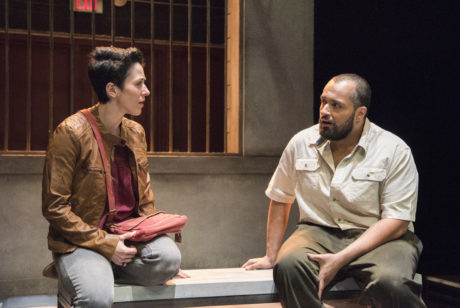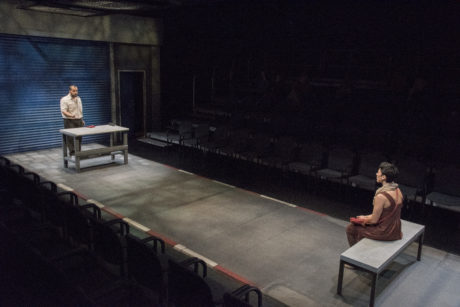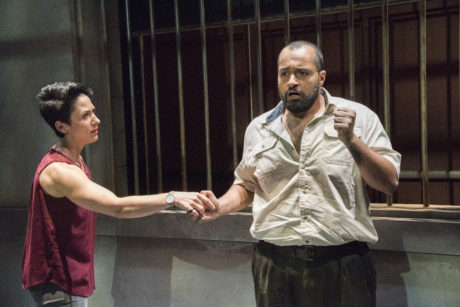Inside this taut and provocative two-character play—which vividly evokes the political tension between the Israeli state and its Palestinian citizens—there is a startling sex scene, one that vividly evokes the sexual tension between a woman and a man. It is an explicit, erotic hookup with shocking consequences. To the best of my recollection, it is the first per se sex scene in a production at Mosaic Theater Company of DC. So you’d think it would make a ripple of news. Yet curiously this sex scene has received only glancing attention in press commentary about the play. Often as not, it’s not even mentioned. At a post-show panel discussion I attended, nobody brought it up. I find this curious. I think that sex scene warrants a very close look.
We don’t actually see the sex scene on stage. We see it in our mind’s eye, through the clarity of the writing and the extraordinary performances of two gifted actors. It happened thirteen years ago, between the man and woman who now appear before us onstage. They are named in the program only by generic gendered pronouns, Him and Her—as if to seem both anonymous and archetypal.
The Return by Hanna Eady and Edward Mast, directed flawlessly by John Vreeke, is receiving its U.S. premiere as the culminating production of Mosaic’s stellar second season. It continues the Voices from a Changing Middle East Festival, which Artistic Director Ari Roth inaugurated sixteen years ago at Theater J. Both playwrights are also actors, and their script is as playable as it is profound.

Eady is Palestinian-American; Mast, his collaborator, is American. Their jointly authored dramatic work The Return is distinguished by what Roth has called its unmediated Palestinian lens. Meaning: There is no doctrinaire deference to Israeli state interests in it. A 2016 production in Hebrew at an Arab theater in Haifa was shut down after eight performances. As Eady explains in an interview with my DC Metro Theater Arts colleague Ravelle Brickman:
The government simply decided that Jews should not see or hear anything that expressed a Palestinian point of view, or that suggested an abrogation of human rights.
Besides the authors’ pro-Palestinian sympathies, The Return is also distinguished by having as its inciting incident a sex scene. Meaning: Had the sex not happened, there would be no play.

The Return is set in Israel in a city about ten miles north of Tel Aviv, in the front office of an auto repair garage. A woman who is Jewish arrives (Alyssa Wilmoth Keegan), ostensibly because her car needs fixing. Though it is the Sabbath, she finds one mechanic on duty, a man who is Arab (Ahmad Kamal). As we will learn, the woman’s motives are not automotive.
Thirteen years ago she and he had a brief romance that involved, on more than one occasion, passionate lovemaking that by both their accounts was mutually gratifying. “It felt real,” she recalls, and he concurs.
In no way did he physically coerce her; she has a speech making that clear (putting to rest any speculation that might arise from seeing Keegan’s slight size next to Kamal’s big and burly build). Their characters both wanted it and they wanted each other. There was just one catch. He’s Arab, and he led her to believe he’s Jewish. She was attracted to him with that understanding and would not have been otherwise. She makes clear she would have had nothing to do with him had she known he was Arab. (Her prejudice, a plot point, suffuses his world and the world of the play.) Thus with her uninformed consent, the sex she had with this man was in all other ways really good.
So-called rape by fraud, or rape by deception, is a crime in Israel (as it is in the U.S. and the UK). In 2010 a man was convicted of the crime in Israel for lying about being Jewish, which may have suggested The Return’s inciting incident, though Eady and Mast have veered so far from that case its only relevance is to posit that such a plot point could plausibly happen.
In Eady and Mast’s brilliantly constructed story line, the man is tried for committing rape by deception; and at trial, she testifies against him without disclosing her own volition, agency, and pleasure in their sexual encounters. Her testimony about his deception is thus itself a deception. The question Who violated whom? thus looms. She is haunted by guilt over what she did to him then and has come to atone and ask his forgiveness.
“I want us to just be people,” she tells him at one point.
“They built this place where you and I can never be the same,” he replies.
In the political context of Jewish-Arab relations, those two lines reverberate.
And in the gender-binary context, they throb.

Much of The Return tracks in chilling detail the dreadful consequences that befall the man after his conviction. We are left with no doubt had he not been Palestinian, Israeli law would not have charged him, nor would the state have crushed his soul so.
In the woman’s character arc the authors have crafted a damning critique of the illusion of the efficacy of good intentions. We leave the theater judging not only her but also all who are complicitous, wittingly or not, in state-sanctioned hate and whose crimes cannot be cleansed.
The backstory of the man’s and the woman’s sex scene is by no means what The Return is “about.” But that scene’s particulars make what the play is about far more than a personal microcosm of a political macrocosm. The man’s and woman’s shared sexual history engages us where we live, as much in the abstract in our consciences as palpably in the bodies we inhabit. Tuning into this important function of the sex scene is to appreciate all the more this play’s depth.
The Return at Mosaic is more than a play to be touched and troubled by. It’s a play to get in the gut.
Running Time: 75 minutes, with no intermission.
The Return plays through July 2, 2017, at Mosaic Theater Company of DC performing at the Atlas Performing Arts Center – 1333 H Street NE, in Washington, DC. For tickets, call the box office at (202) 399-7993 ext. 2, or purchase them online.
LINKS:




